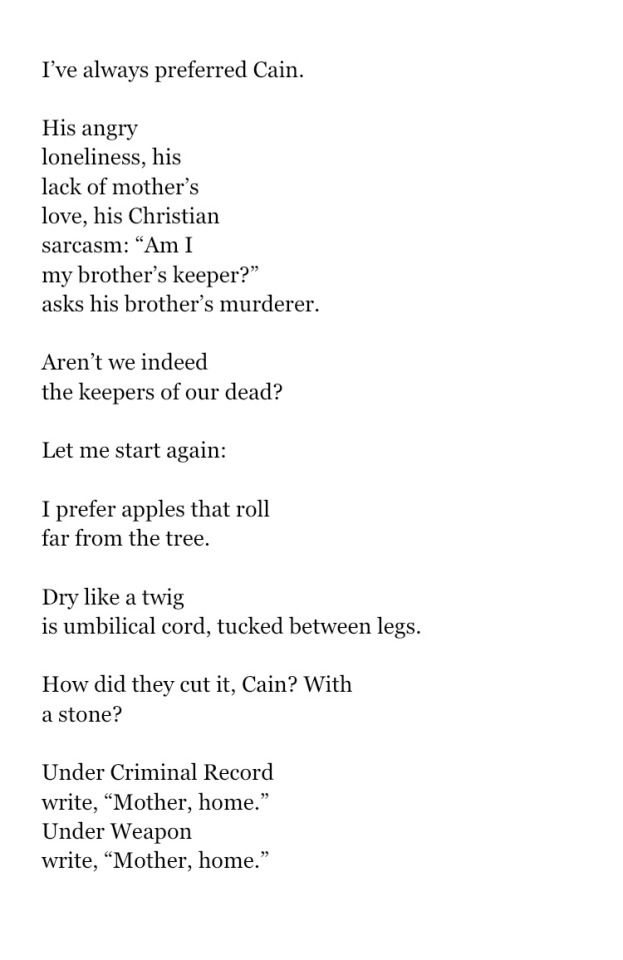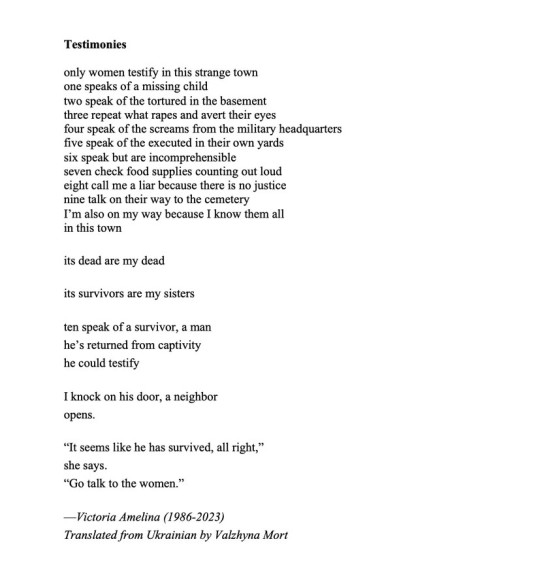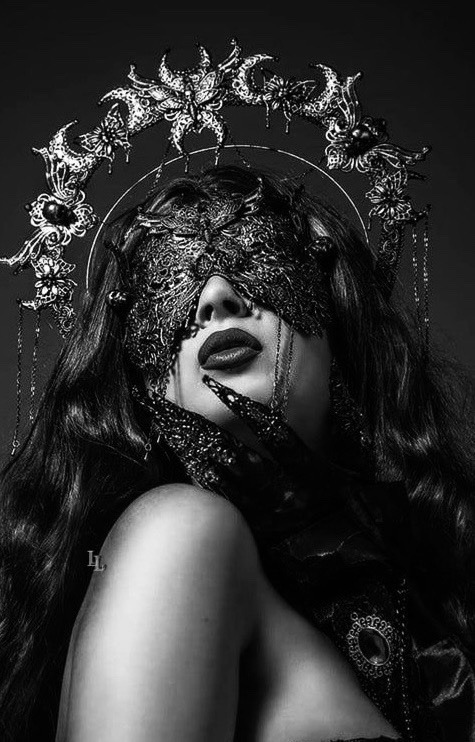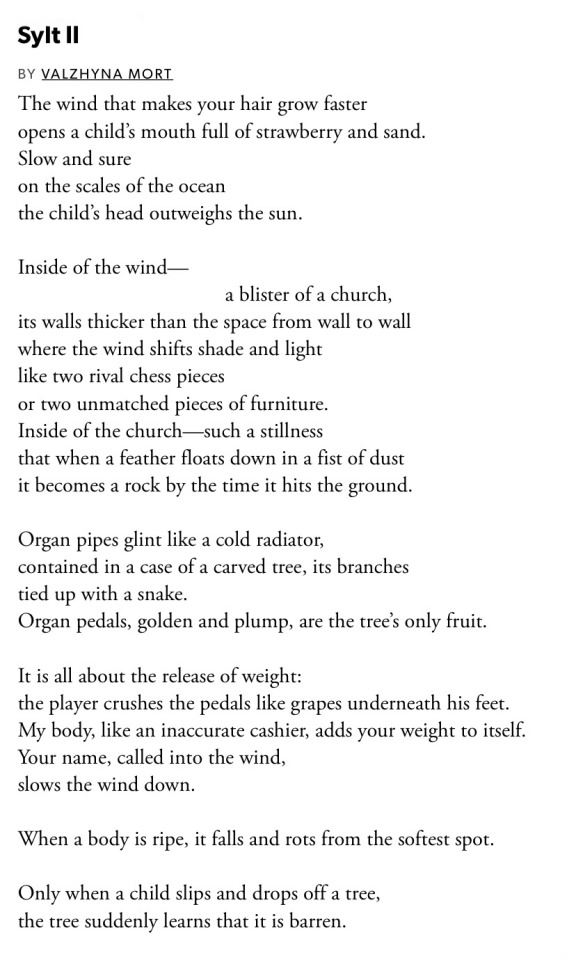#Valzhyna Mort
Text

Music for the Dead and Resurrected, Valzhyna Mort
#quotes#quote#poetry#poem#Valzhyna Mort#poem title is ‘Genesis’#id in alt text#y’all know I love a Cain poem
5K notes
·
View notes
Text
on storytelling and repetition
“...the secret of the Great Stories is that they have no secrets. The Great Stories are the ones you have heard and want to hear again. The ones you can enter anywhere and inhabit comfortably. They don’t deceive you with thrills and trick endings. They don’t surprise you with the unforeseen. They are as familiar as the house you live in. Or the smell of your lover’s skin. You know how they end, yet you listen as though you don’t. In the way that although you know that one day you will die, you live as though you won’t. In the Great Stories you know who lives, who dies, who finds love, who doesn’t. And yet you want to know again.”
— Arundhati Roy on Indian mythology and folklore, in God of Small Things (1997)
“It was only once – once – that an audience went to see Romeo and Juliet, and hoped they might live happily ever after. You can bet that the word soon went around the playhouses: they don’t get out of that tomb alive. But every time it’s been played, every night, every show, we stand with Romeo at the Capulets’ monument. We know: when he breaks into the tomb, he will see Juliet asleep, and believe she is dead. We know he will be dead himself before he knows better. But every time, we are on the edge of our seats, holding out our knowledge like a present we can’t give him.”
— Hilary Mantel on Shakespeare’s Romeo and Juliet, in “Can These Bones Live?”, Reith Lecture, 2017
“So what makes this poem mnemonic is not just repetition. Rather, it’s the fact that with repetition, the repeated phrase grows more and more questionable. I’ve remembered “Come on now, boys” because, with every new repetition, it seems to offer more exasperation than encouragement, more doubt than assertion. I remembered this refrain because it kept me wondering about what it meant, which is to say, it kept me wondering about the kind of future it predicted. What is mnemonic about this repetition is not the reader’s ability to remember it, but that the phrase itself remembers something about the people it addresses; it remembers violence. Repetition, then, is not only a demonstration of something that keeps recurring: an endless supply of new generations of cruel boys with sweaty fists. It is also about our inability to stop this repetition: the established cycles of repetition are like spells and there’s no anti-spell to stop them from happening. The more we repeat, the less power we have over the words and the more power the words have over us. Poetic repetition is about the potency of language and the impotence of its speakers. In our care, language is futile and change is impossible.”
— Valzhyna Mort on Russian poet Yevgeny Yevtushenko, in “FACE – FACE – FACE: A Poet Under the Spell of Loss”, The Poetry Society Annual Lecture, 2021
#web weaving#quote compilation#shakespeare#romeo and juliet#Hilary Mantel#arundhati roy#valzhyna mort#excerpt#on poetry#on storytelling#god of small things
2K notes
·
View notes
Quote
I don’t write about her life [her grandmother]. I write about myself surviving her stories of survival in the kitchen of our apartment in an ugly, yet beautiful, Soviet micro-region, where Mozart is on the radio and Tchaikovsky is on TV as the empire finally collapses. I was poised between violence and music, and music has taught me that, if you listen long enough, everything eventually becomes music.
Valzhyna Mort, from “Interview with Valzhyna Mort”, The White Review, November 2022
795 notes
·
View notes
Text
You can drink water from any well
or jump in and drown yourself.
You can hang yourself from one of the garden branches
or pick a half-rotten apple.
Bless this landscape of choices, clear as a clear night.
Turnips and beets grow straight into the throats
of the dead.
Valzhyna Mort, from “Ode to Branca,” Music for the Dead and Resurrected (Farrar, Straus and Giroux, 2020)
149 notes
·
View notes
Text

But often to shed light on the darkness, light isn't enough. Often what I need is an even darker darkness.
~Valzhyna Mort
197 notes
·
View notes
Quote
Often what I need is an even darker darkness.
Valzhyna Mort, Collected Body
619 notes
·
View notes
Text
"I've always preferred Cain.
His angry
loneliness, his
lack of mother's
love, his Christian
sarcasm: "Am I
my brother's keeper?"
asks his brother's murderer.
Aren't we indeed
the keepers of our dead?"
Read it here | Reblog for a larger sample size!
#closed polls#polls#poetry#poems#poetry polls#poets and writing#tumblr poetry#have you read this#i've always preferred cain#valzhyna mort#music for the dead and resurrected
13 notes
·
View notes
Text
I'm barricaded behind a sob.
Valzhyna Mort
6 notes
·
View notes
Text

Music for the Dead and Resurrected, Valzhyna Mort
616 notes
·
View notes
Text

5 notes
·
View notes
Quote
but the poet moves through the shame of speech. It’s the shame of discovering that speech is possible and that you speak despite knowing full well that it’s best to be silent.
Valzhyna Mort, from “Interview with Valzhyna Mort”, The White Review, November 2022
103 notes
·
View notes
Text
[...] our woods that only conifers
get to escape---
tarred with honey they swim
---strange fish---to shipyards
where, rootless, amnesiac,
they are built into ships
that cross an ocean like a street.
Valzhyna Mort, from “Music for Girl's Voice and Bison,” Music for the Dead and Resurrected (Farrar, Straus and Giroux, 2020)
13 notes
·
View notes
Text

Often what I need is an even darker darkness.
~Valzhyna Mort
222 notes
·
View notes
Text
"Now the trains stand frozen in a winter storm,
and i pity the trains
as if they were shivering butterflies,
a whole herd of them, the last of their kind,
stuck in the snow England has never seen."
--Valzhyna Mort, from Music for the Dead and Resurrected
2 notes
·
View notes
Text
Death stood behind her left shoulder knocking on her body.
Valzhyna Mort, Collected Body
19 notes
·
View notes
